
Tell us what you need to find a matching loft conversion specialist

Get free quotes from professionals near you

Compare offers and choose the one that best matches your need
- Householdquotes.co.uk
- Driveway
- Driveway Cost
- Paving Driveway Cost
How Much Can Paving A Driveway Cost You?

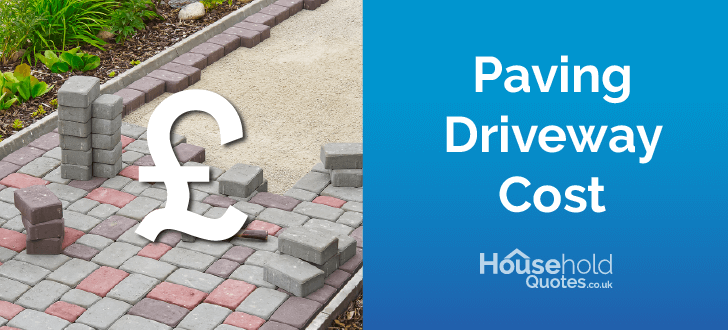
- The average cost of block paving is approximately £100 per m2. The cost of block pavers depends on the chosen material, the shape, size, and design of the driveway, and your location.
- Concrete is the least expensive block paver material, costing between £20 and £60 per m2.
- Natural stone pavers are the most expensive material, ranging from £50 to £108 per m2.
- The labour cost for driveway paving typically ranges from £50 to £100 per square meter.
Paving your driveway in the UK provides a safe and functional parking space for your vehicles. It enhances your property's curb appeal, increasing its value. However, understanding your driveway cost can feel overwhelming.
At Household Quotes, we understand the challenges of determining driveway paving costs. That's why we've created a comprehensive guide to help you make informed decisions, regardless of your project's size. By providing essential knowledge, we aim to save you time and money.
Understanding driveway paving costs is just the beginning. Comparing quotes and finding the right installer are crucial to securing the best deal for your driveway installation.
We offer a convenient solution by providing four free quotes from local driveway specialists. Fill out our quick 30-second form to access the best driveway installers in your area. There are no hidden fees or obligations. Click below to learn more.
- Describe your needs
- Get free quotes
- Choose the best offer
It only takes 30 seconds

Average driveway paving cost per m2
The cost estimate to pave a 30 m² driveway capable of holding two cars is approximately £3,000. Block paving typically costs £100 per m² on average.
However, various factors can influence the driveway cost, such as the materials chosen, their quality, the complexity of the design, the amount of preparation needed, and the location.
Furthermore, block paving is more expensive than gravel, asphalt, or concrete because each block must be laid individually to complete the driveway.
The size of the driveway significantly impacts the paving cost, as larger driveways require more materials and labour. Below are the most common driveways to provide an estimation of costs:
| Driveway size | Average cost |
|---|---|
| 2 cars (30m2) | £3,000 |
| 4 cars (40m2) | £4,000 |
| 6 cars (60m2) | £6,000 |
Why is block paving a common option for driveways?
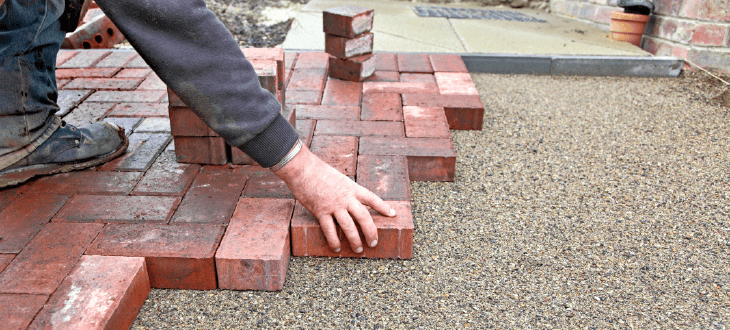
Block paving is a type of driveway made from individual bricks or blocks laid in a specific design to create a durable, long-lasting, and aesthetically pleasing paved surface.
Block paving offers a variety of material options, including natural stone, clay, concrete, and permeable and composite pavers.
Concrete can significantly reduce block paving prices if you want a budget-friendly driveway. Due to its abundant raw materials and simple production process, concrete is one of the most cost-effective materials.
Furthermore, concrete block pavers can provide a nearly identical aesthetic to the more expensive alternative brick pavers.
On top of their ability to mimic more expensive driveways, block pavers offer several benefits, such as:
- Low maintenance: Block pavers are very easy to clean. With the occasional use of a power washer and a regular sweep, you can keep your driveway surface looking clean and free from damage. If damage does occur, individual pavers can be easily replaced without affecting the entire driveway surface.
- Versatile: Block pavers come in various colours due to the wide range of materials used to create them, allowing you to personalise your driveway according to your preferences.
- Durable: Block paving materials such as concrete, natural clay, and stone can withstand heavy loads and traffic, creating an exceptionally durable driveway.
- Long-lasting: Due to their durability and strength, block paving driveways can last between 20 to 25 years if maintained properly, according to Aggregate Industries.
Block paving driveways are popular because they provide strength, versatility, and visual appeal. Although brick pavers costs are more expensive than traditional asphalt, concrete, or gravel, they offer a range of benefits, making them a common option for driveways.
How much do driveway paving materials cost?
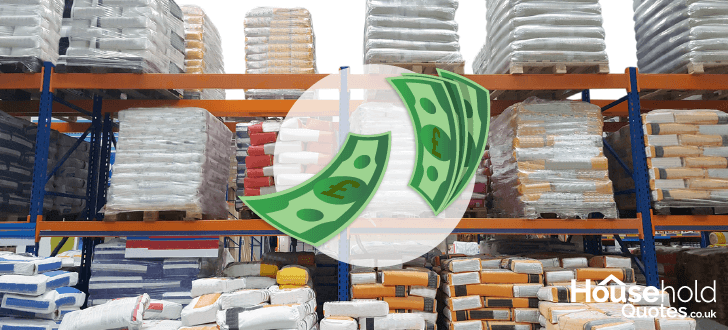
Understanding block paving prices is crucial for creating a budget for your driveway. Knowing the cost allows you to compare materials and designs, choose the best option for your preferences and needs, and avoid unexpected expenses. Here is a breakdown of what you need to create a block-paving driveway:
- Block Pavers: Based on your aesthetic preference and budget, choose from various types, such as concrete, clay, or natural stone. The prices of these materials can range from £20 to £125 per m2.
- Sub-base Material: Typically, a compacted base layer of crushed stone or gravel, such as MOT Type 1, is used. According to NorthWest Aggregates, a one-tonne bag of MOT Type 1 costs around £52.25.
- Sharp Sand: Used for the laying bed to provide a level surface for the pavers. According to PriceYourJob, the average cost of sharp sand is around £250.
- Edge Restraints: These are often made of concrete, timber, or metal to keep the pavers in place and maintain the structure. They typically cost £1,700.
- Jointing Sand: Fine, dry sand is brushed into the joints between the pavers to lock them in place. On average, jointing sand costs around £250.
- Geotextile Fabric (optional): Placed beneath the sub-base to prevent weed growth and improve drainage, the average cost will be between £30 to £50 per m2.
Understanding the costs of materials can help you make informed decisions and choose the right materials based on your budget and needs. Below, we provide detailed information on low, mid, and high-cost ranges for block paver materials.
Low-cost block paving supplies:
You can create a durable and affordable block-paving driveway without overspending. To lower the overall block paving driveway cost, consider using cost-effective supplies such as concrete pavers, which are durable and budget-friendly.
Concrete is the cheapest driveway option for block paving. The cost of concrete block pavers can range between £20 and £60 per m2. It is one of the most popular choices for several reasons. In addition to being budget-friendly, it is one of the strongest construction materials available.
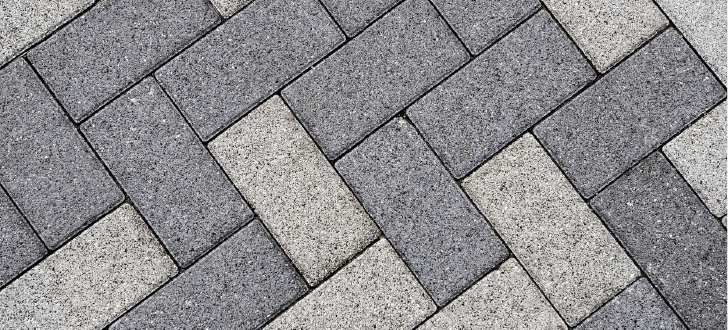
This means that choosing this type of driveway will ensure longevity and be less prone to damage, such as cracking or sinking.
However, the downside of concrete is that it is prone to fading and stains and has a lack of colour options compared to clay or natural stone.
If you are looking for a unique pattern with a versatile colour palette that is still cost-effective, then opting for imprinted-coloured concrete may be the best option.
It mimics the look of block paving, allowing you to create a unique pattern with added colour to the concrete in a selection of earthy tones.
On average the imprinted concrete driveway cost per m2 is £80. Though more expensive, it provides you with options for colours and patterns.
Choosing more affordable edging restraints, such as concrete edge restraints or timber edging, will lower the overall block paving cost.
It is advisable to select concrete edging over timber, as timber is more susceptible to damage from wood rot, which will mean higher repair costs in the future. Concrete edging typically costs £55 per meter, while timber edging costs an average of £6.50 per meter.
Lower-cost supplies do not mean you have to sacrifice quality for your driveway. With careful planning, you can create a long-lasting, cost-effective block-paving driveway.
Mid-cost block paving supplies
Mid-cost block paving supplies offer a balance between affordability and quality. They provide a durable and visually appealing option for driveways without the high price tag of premium materials.
These materials often offer better longevity and weather resistance, making them a wise investment for homeowners seeking long-term value.
Additionally, they can include decorative elements or patterns that add sophistication to the driveway, enhancing the property's curb appeal.
Choosing mid-cost block paving supplies allows homeowners to achieve a stylish and reliable driveway that complements their home while staying within a moderate budget.
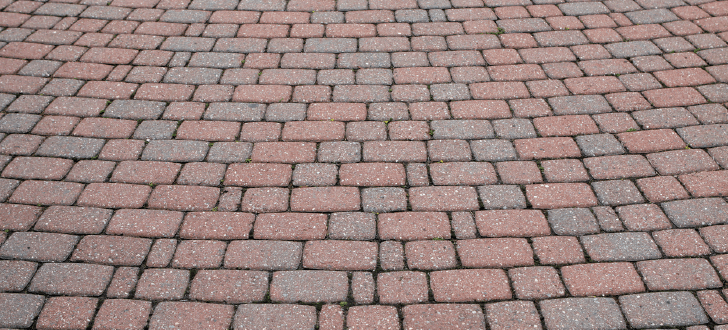
Clay is considered a mid-range block paver material. On average, they can cost between £70 and £100 per m2, depending on the block's quality, size, and thickness.
Compared to concrete, clay block pavers create a visually appealing entryway due to the natural tones the clay brick creates and always provide an anti-slip and anti-stain paved driveway.
Another material to stay within the mid-range block paving price is choosing a permeable paver. The average cost of a permeable paver is £60 to £90 per m2.
Permeable pavers are an excellent option for driveway installation since they eliminate the need for a separate drainage system, preventing the risk of flooding and saving up to £1,000 on a drainage system.
High-cost block paving supplies
High-cost block paving supplies offer the highest quality, durability, and aesthetic appeal, making them ideal for homeowners looking to create a luxurious and standout driveway. Furthermore, these materials will reduce driveway repair costs due to their quality, strength and durability.
These premium materials often include natural stone pavers, such as granite, marble, or sandstone, providing unparalleled elegance and unique visual textures.
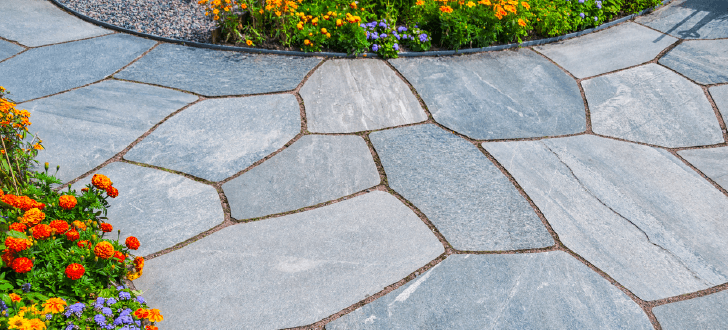
Natural stone pavers will cost, on average £50 to £108 per m2, and these brick paver costs depend on the type of stone you choose. Marble is considered the most expensive, while sandstone is the most cost-effective.
Composite pavers are another high-cost material for block paving supplies, averaging between £95 and £125 per m2. They are a great choice for creating a more sustainable driveway. Made from recycled materials, they are extremely lightweight yet offer the same durability and strength as concrete pavers.
Choosing metal edging for your driveway will enhance its quality and durability. Although pricier than concrete or timber edging, metal edge restraints offer exceptional durability, meaning your driveway will require less maintenance in the long run. On average, metal edging costs £75 per meter.
Investing in high-quality block paving supplies is a wise choice. They offer exceptional durability and aesthetic appeal, enhancing your property's curb appeal and creating an impressive entrance.
What are the labour costs for driveway paving?
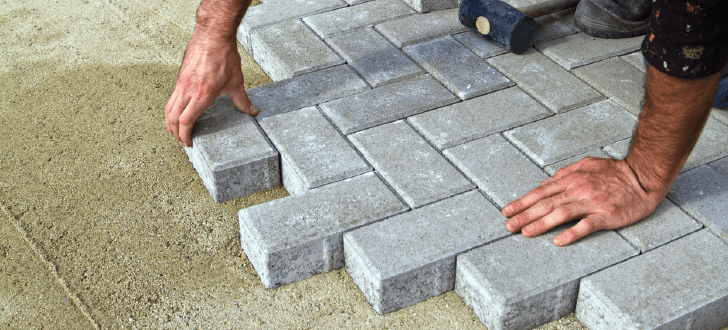
Labour costs for driveway paving can vary depending on several factors, including the size and complexity of the project and its geographical location.
Generally, labour costs constitute a significant portion of the overall expense of driveway paving. According to PriceYourJob, labour will account for 70% of the block paving price.
Block paving labour costs typically range between £50 and £100 per m2, depending on the driveway's size and complexity, the chosen pattern, and the driveway specialist's experience. Additionally, costs can increase if the current driveway is damaged.
Driveway specialists usually charge a daily rate, an average of £150 to £200 per person. The labour cost increases with the amount of time spent constructing the driveway. A standard driveway should take between 4 to 5 days to complete.
We have provided a breakdown of low, mid, and high costs for block paving labour to accommodate various budgets and preferences.
Low-cost labour for block paving
To keep the labour costs for block paving low and within your budget, consider the following:
- Opt for a smaller driveway size.
- Choose a simple design.
- Hire local contractors.
Limiting the size, shape, and complexity of your driveway is the most effective way to reduce labour costs. For instance, a driveway of around 30m2, which can accommodate two cars, will take less time to construct, typically around 4 to 5 days. This can significantly decrease labour costs, with the average brick paver cost being around £3,000.
Hiring local driveway specialists can further reduce labour costs. Local specialists tend to charge less since costs are saved on the transportation of materials, labour, and equipment. By researching and hiring local contractors, you can further reduce block paving prices and stay within budget.
Mid-cost labour for block paving
Mid-range labour costs allow you to maintain an affordable driveway while adding unique features that may incur higher labour costs but will create a distinctive and functional driveway tailored to your needs.
Mid-cost driveways are often focused on slightly larger areas, around 40m2 and average around £4,000. Typically, a medium-sized driveway will take 5-6 days to complete.
Furthermore, when you have a slightly bigger budget for your driveway, you can afford to create a driveway with certain features, such as a more complex design and a curved shape.
A curved driveway will increase labour costs but can enhance a property's visual appeal by adding visual interest and breaking up the monotony of straight lines.
Curved driveways can create a more inviting entrance, providing a softer transition from the street to the home. Moreover, they can complement a property's natural landscape and architectural features, enhancing its overall curb appeal.
By retaining a medium-sized driveway, you can afford to spend on labour for more complex designs and unique shapes.
High-cost labour for block paving
High-cost labour for block paving typically involves hiring experienced professionals or specialized companies offering premium services.
Choosing professionals with extensive experience and expertise in driveway paving can ensure superior craftsmanship and attention to detail, resulting in a high-quality, long-lasting driveway installation.
These professionals have the knowledge and skills to prepare the site correctly, select the appropriate materials, and execute complex designs or patterns with precision.
When you budget for higher labour costs, you have the freedom and ability to create a larger driveway with more intricate designs and features. On average, a larger driveway of 60m2 will cost around £6,000.
Higher labour costs provide assurances such as warranties or guarantees, giving homeowners peace of mind and protection against potential issues or defects.
In addition, reputable paving companies may use advanced techniques and equipment to optimize the efficiency and durability of the installation, further justifying the higher labour costs.
Investing in high-cost labour for block paving can deliver superior results, enhancing the property's curb appeal, functionality, and value while minimizing the need for future repairs or maintenance.
Is DIY driveway paving worth it?
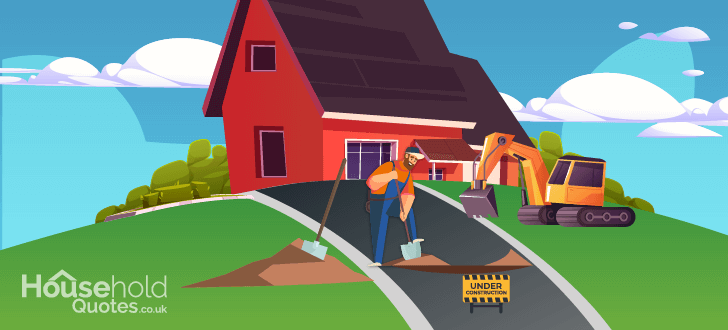
Embarking on a do-it-yourself (DIY) driveway paving project can be a tempting option for homeowners looking to save money and add a personal touch to their property.While DIY paving offers the potential for cost savings, it also comes with several considerations.
First and foremost is the level of skill and expertise required for successful installation. Paving a driveway involves precise measurements, proper grading, and careful material placement to ensure durability and longevity.
Without experience in these areas, DIYers may encounter challenges and errors that could compromise the quality and functionality of the driveway.
While initial DIY block paving prices may be more cost-effective, poorly installed block pavers can cause extensive damage to your driveway, which requires costly repairs.
Moreover, DIY paving requires significant physical labour and can be time-consuming, especially for larger driveways or intricate designs. Additionally, purchasing or renting specialized equipment and tools adds to the upfront costs.
We recommend working closely with driveway specialists who will help you budget effectively while creating long-lasting and durable driveways.
It is recommended that you compare multiple quotes from different driveway installers to find the best deals and reduce costs.
However, finding the right contractor for a project can be frustrating. It often involves a lot of time and effort, as you must research and contact multiple contractors or companies to request quotes.
This can be time-consuming and lead to delays and uncertainty about when you'll receive the information you need.
Here at Household Quotes, we understand the frustration of comparing multiple quotes and are here to help. We can provide four free non-binding quotes from local driveway installers tailored to your needs.
Our 30-second form makes it easy to access the quotes you need and simplifies finding the right contractor for your project. Click below to find out more.
- Describe your needs
- Get free quotes
- Choose the best offer
It only takes 30 seconds

FAQ
On average, block paving costs around £100 per m2. Prices can depend on your location, the shape and size of your driveway, the complexity of the pattern, and the materials you choose.
Labour costs for block paving in the UK range from £50 to £100 per square metre. The costs are influenced by the size of your driveway, the complexity of the chosen pattern, and the experience of the driveway specialist.
Block paving is more expensive than concrete because of the amount of labour involved in laying it. While you can choose concrete block pavers, flat-poured concrete is still more cost-effective as it is easier to install.

Caoimhe is an experienced content writer and researcher who is passionate about providing accessible information to every reader. With a background in English literature and Sociology, she combines the two disciplines to create cohesive, well-thought-out, and well-informed pieces.
